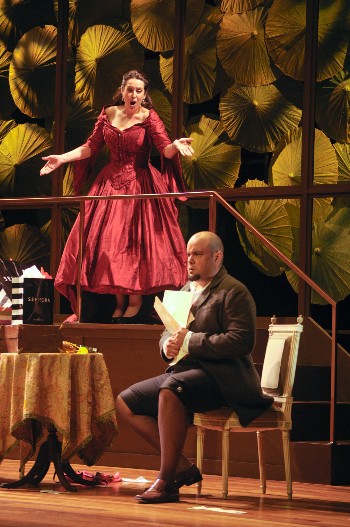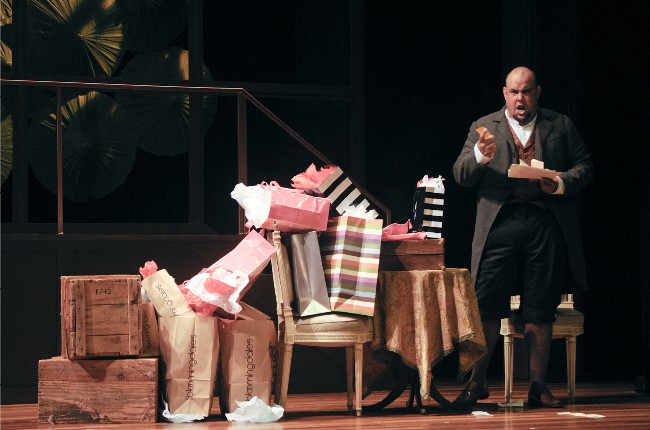Opera Review: The Sparkling Human Comedy of “Don Pasquale”
Under the baton of its artistic director, Susan Davenny Wyner, Boston Midsummer Opera has become an annual highlight of Boston’s classical music line-up during the summer.
Don Pasquale by Gaetano Donizetti. Directed Austin Pendelton. Staged by Boston Midsummer Opera at the Tsai Performance Center, Boston University, Boston, MA, July 27 and 29.
By Susan Miron

Leslie Ann Bradley as Norina and Ricardo Lugo as Don Pasquale in a scene from Boston Midsummer Opera’s production of DON PASQUALE. Photo: Christopher McKenzie
Gaetano Donizetti, the immediate historical precursor of Verdi, shared the fate of Handel and Janacek, who wrote important operas that were forgotten, rediscovered, and then incorporated into the mainstream repertory. Donizetti (1797–1848) was considered a “diligent hack,” as Richard Dyer (the former Boston Globe music critic) noted in his witty pre-concert talk. But the composer knew how to pace and shape an opera.
Don Pasquale was Donizetti’s 64th opera, composed in warp speed—11 days. Others of the 12 he is known and loved for are Lucia di Lammermoor, La Fille du Régiment, the Tudor trilogy, and L’Elisir d’Amore. When he composed this opera buffo, the days of comic opera were long over, but what Donizetti created was more than just a farce: it was a human comedy, full of emotional complexity.
The opera was first performed in Paris in 1843. One of the morals of Don Pasquale is, as Mr. Dyer put it, “if you wait too long to marry, it gets more challenging.” Certainly that is the case for the opera’s eponymous older man, sung by the Metropolitan Opera bass Ricardo Lugo. The plot is highly convoluted, in the spirit of Commedia dell’Arte. Lesley Ann Bradley, the soprano (who recently, like tenor Alex Richardson, won the Met auditions for the New England region) is not only gorgeous but a great comedienne. She supplies one of the production’s highlights when, after “marrying” Don Pasquale, she returns home blissed-out from a shopping bender—there are Bloomingdales and Sephora bags galore. Later, in an attempt to alienate her “husband,” the character tries to leave for the theater in an absolutely fabulous, red dress. Ms. Bradley sang gloriously, hitting high C after high C with every note on the way up beautiful. I hope she sings again with BMO next summer.
Don Pasquale was sung and acted to perfection by the Metropolitan Opera bass Ricardo Lugo. He handled the transformation of an aging, lonely bachelor craving a wife into a perplexed husband with ease. Lugo’s body language and eyes took on a distinctive personality of their own. His look of terror and astonishment when he sees his new wife’s bills was a delight to watch.
As Ernesto, tenor Alex Richardson is around to fall in love with the soprano, not an uncommon thing in opera, and the tenor, despite myriad travails, usually wins in the end. Richardson sang very well, and, unsurprisingly, managed to get the girl. What more can a tenor wish for?
Finally, there is the conniving Dr. Malatesta, without whom there would be no convoluted plot. He was sung and acted fabulously well, but I have come to expect a high level of excellence from baritone David Kravitz. Like Lesley Ann Bradley, he has sung in Boston Midsummer Opera productions before, and, like all the other singers in this staging, he acted as well as he sang.
I did not particularly care for the highly stylized set, which looked like the back of an unfinished building, with a balcony, outlined windows, and a ramp that served as a platform for the singers. The third act proffered an array of greenish umbrella tops that were added to the background as well as the foreground. I was unimpressed. But the stage direction by Austin Pendelton was superb; he explored each of the character’s potential for humanity and humor.

Ricardo Lugo as Don Pasquale in a scene from Boston Midsummer Opera’s production of DON PASQUALE. Photo: Christopher McKenzie.
With only 11 strings, the orchestra (in its reduced form) sounded thin during the important overture, but the group sounded better accompanying the BMO’s powerful singers. The flute, given several solo moments, was played very well by Jessica Lizak. Gary Gorczyca (whose musicianship I have admired in the Chameleon Arts Ensemble) played the clarinet parts beautifully, and the crucial bassoon parts were deftly performed by Ron Haroutunian. The memorable cello solos were played expertly by Sam Ou.
Under the baton of its artistic director, Susan Davenny Wyner, Boston Midsummer Opera has become an annual highlight of Boston’s classical music line-up during the summer. She conducted marvelously. Now in its seventh season, the BMO’s run for this production is almost sold out. And why not? The tickets are affordable (by opera standards) and the quality of the singers in the two years I’ve been going to their productions has been excellent. I attended partly to hear Boston favorite, baritone David Kravitz. Given what I overheard at intermission, many others came to hear him as well.
Among BMO’s stated goals are “to widen the audience for this beautiful art form by mounting witty productions with exciting artists that will attract new listeners as well as appeal to discriminating opera fans.” Mounting witty productions, check. Exciting artists, check. Opera fans, check. New listeners? Not so sure, unless they are well into middle-age or older. Where are all the younger people, like the BU students that were hanging out on Commonwealth Ave last night? Tickets are dirt cheap, and there are many summer school sessions within biking distance. Maybe it’s a marketing problem. I am certain many young people would have loved this BMO production, to the point that Don Pasquale might have kicked off a love affair with opera.
Tagged: Boston Midsummer Opera, David Kravitz, Don Pasquale, Gaetano Donizetti
